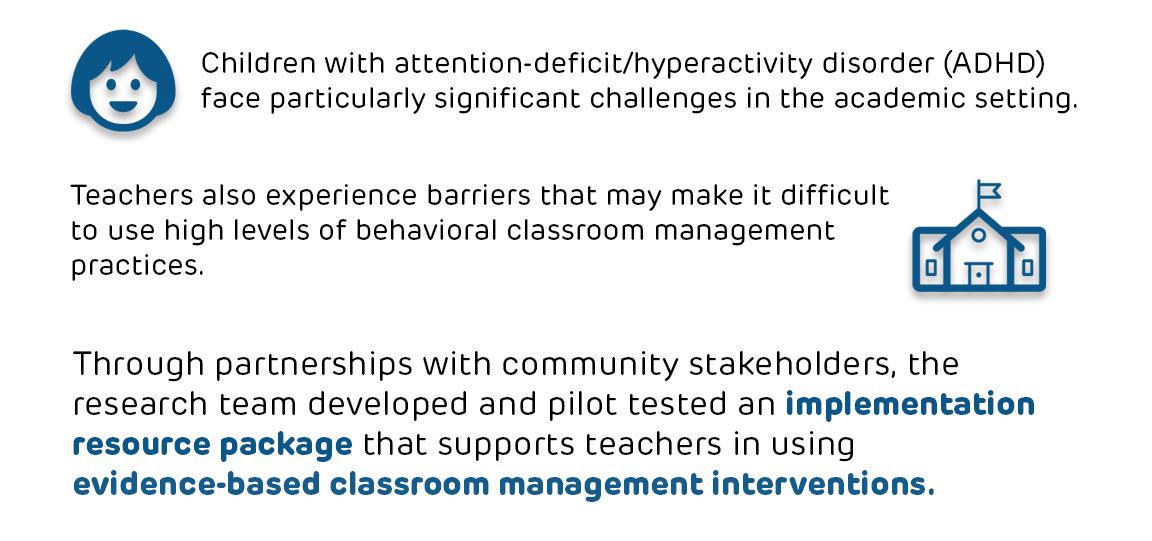Supporting Implementation of Behavioral Classroom Interventions for Children with ADHD in Urban Schools
Statement of Problem
Children with attention-deficit/hyperactivity disorder (ADHD) are at increased risk for negative social, emotional, and health outcomes, and face particularly significant challenges in the academic setting. Without effective treatment, children with ADHD are more likely to drop out of school and experience social challenges. This problem is especially urgent in low-income, urban communities, where a large number of children show symptoms of ADHD or related concerns. It is, therefore, critical to increase the accessibility and quality of support these children receive at school.
Behavioral classroom management interventions (for example, using high rates of specific, contingent praise) are well-established treatments for elementary school-age children with ADHD. However, teachers face many challenges that may make it difficult to use high levels of behavioral classroom management practices. Little is known about specific barriers or facilitators to teachers’ use of behavioral classroom management interventions for children with symptoms of ADHD, or about ways to effectively support teachers in using these practices.
Description
Supporting Implementation of Behavioral Classroom Interventions for Children with ADHD in Urban Schools
Supporting Implementation of Behavioral Classroom Interventions for Children with ADHD in Urban Schools


In providing this resource for educators, our goal is to enhance outcomes for children with ADHD.
This project seeks to address knowledge gaps on effective approaches to support teacher use of evidence-based behavioral interventions for students with symptoms of ADHD in urban schools. Through partnerships with community stakeholders, the research team developed and pilot tested an implementation resource package that supports teacher use of evidence-based classroom management interventions. In providing this resource for educators, our goal is to enhance outcomes for children with ADHD.
For the first step of this work, we conducted surveys and interviews with teachers to identify barriers and facilitators to implementing four evidence-based classroom management interventions, as well as their attitudes and perceived norms related to the interventions. Based on what we learned, we iteratively developed the implementation resource package to support teacher use of behavioral classroom interventions with increased frequency and fidelity, obtaining feedback from teachers throughout its development.
Next Steps
As the final step of this project, we pilot tested the refined resource package in a small-scale randomized controlled trial in order to determine its feasibility and promise for use among educators. Results suggested that the resource package was highly acceptable and feasible and may help teachers use behavioral classroom interventions, although larger-scale evaluation is still needed.
Supporting teachers in their use of effective interventions to enhance outcomes for students with symptoms of ADHD is crucial for child development and to achieve equitable mental health care and educational opportunities. The results of this study address a gap in understanding the implementation of behavioral classroom management interventions, and provide a foundation for future work supporting these interventions on a larger scale.
This project page was last updated in January 2026.
Suggested Citation
Children's Hospital of Philadelphia, PolicyLab. Supporting Implementation of Behavioral Classroom Interventions for Children with ADHD in Urban Schools [Online]. Available at: http://www.policylab.chop.edu. [Accessed: plug in date accessed here].